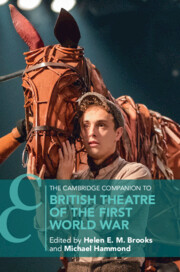Book contents
- The Cambridge Companion to British Theatre of the First World War
- Cambridge Companions to Theatre and Performance
- The Cambridge Companion to British Theatre of the First World War
- Copyright page
- Contents
- Figures
- Notes on Contributors
- Chronology of Events and Productions
- Introduction
- Part I Mobilising for War
- Part II Theatre during the War
- Part III The Memory of War
- Chapter 12 Reflecting on the War
- Chapter 13 Re-imagining the War
- Chapter 14 Commemorating the War
- Further Reading
- Index
Chapter 13 - Re-imagining the War
from Part III - The Memory of War
Published online by Cambridge University Press: 19 October 2023
- The Cambridge Companion to British Theatre of the First World War
- Cambridge Companions to Theatre and Performance
- The Cambridge Companion to British Theatre of the First World War
- Copyright page
- Contents
- Figures
- Notes on Contributors
- Chronology of Events and Productions
- Introduction
- Part I Mobilising for War
- Part II Theatre during the War
- Part III The Memory of War
- Chapter 12 Reflecting on the War
- Chapter 13 Re-imagining the War
- Chapter 14 Commemorating the War
- Further Reading
- Index
Summary
This chapter considers changing representations of the First World War on stage after the Second World War and through to the centenary. It examines the significance of Oh What a Lovely War (1963) as a product of the Cold War and fears over a third world, and nuclear, war. Emphasising the importance of understanding theatrical representations of the war in relation to their socio-political contexts, the chapter shows how the changing political context of the 1990s and anxieties over the loss of memory led to shifts in how the war was represented on stage, with Lovely War increasingly being used to ‘teach’ the war. The chapter argues that twenty-first century plays including Morpurgo’s War Horse and Private Peaceful, and Faulks’s Birdsong, are driven by an imperative to remember the war and fill a gap left by the loss of direct memory and experience of the war. It shows how this leads to the privileging of the personal, individual, micro experience of the war over the macro history of the war. It addresses the tension between history and memory in these plays as well as demonstrating their role in shaping commemoration during the centenary.
Keywords
- Type
- Chapter
- Information
- Publisher: Cambridge University PressPrint publication year: 2023

